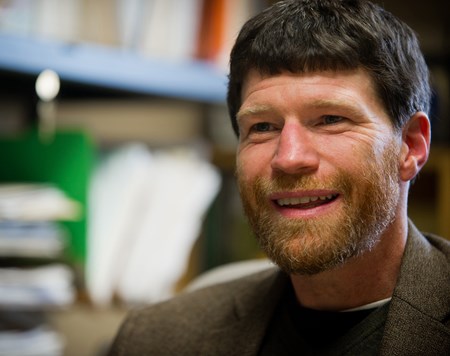Dr. Stephen Gasteyer: Starting the dialogue
April 27, 2021 - Beth Brauer, Stephen Gasteyer
Stephen Gasteyer is an associate professor in the Department of Sociology and MSU AgBioResearch. Recently, Gasteyer participated in MSU Dialogues, an intergroup dialogue program for students, faculty and staff that brings together people from different identity groups and aims to equip participants with the tools to engage in conversation (rather than debate) and to facilitate understanding regarding commonalities and differences by examining the impact of social inequalities.

Few would dispute that the last 14 months have been dramatic. To date, we have experienced a global pandemic, fatal police violence caught on camera, mass demonstrations in protest that were global in scope and thought to be the largest in U.S. history, nationalist/fascist armed militias that tried to overturn an election — including through storming our own state Capitol and then, ultimately, the Nation’s Capitol in Washington, D.C., and a surge in racist violence against people of Asian decent. All of this has brought in to plain view the reality of differential impact by race on our society and our community, including Michigan State University.
People of color (specifically African Americans, Latino/a and American Indians) have been disproportionately impacted by both the pandemic and its economic effects. Even before the pandemic, we were responding to incidents on campus, ranging from poorly conceived research projects to posting intentional symbols of hate — all exacerbated by national politics.
We — faculty, staff and students — are called on in this moment to better understand how to improve the climate at MSU. The Dialogues program provided an opportunity for me, as an associate professor in sociology, to engage with a diverse group of faculty and staff across MSU about issues of race, inequality and justice. An important opportunity given the current situation.
My biggest concern was time. Let’s be honest, I am overcommitted, as are most faculty. The commitment of two hours of prime work hours was precious — not to mention the prep time (assigned readings) for each week’s session. But the payoff exceeded the investment. Even in a virtual environment, every session involved sharing — thoughts, reactions and personal experiences — both with the large group (approximately 10-12) and smaller Zoom breakout room discussions, often in groups of two or three.
These discussions allowed us to explore how our experiences and backgrounds impacted our differential perspectives about all of the events listed above — and issues of race and identity more broadly. As it turns out, we had people who represented a full range of experiences that shaped their perspectives.
We had participants who had survived COVID-19 and experienced firsthand how race impacted treatment associated with the disease; participants who work full-time to improve DEI relations; and those who work in a variety of fields and campus units such as writing, nursing, social sciences, arts and letters and Extension. Some shared experiences of racism and bigotry — both intentional and unintentional; grappled with working with friends and relatives to recognize and correct racial bias and bigotry; and wrestled with family legacies of violence and intolerance. Learning from these conversations provided food for thought and ongoing opportunities for dialogue and reflection.
We had the chance to explore not only difference, but also commonalities and our shared desire for a better world — for a society and community that is more just and steps we might take in that direction.
What MSU Dialogues provided was an important beginning — a baseline for future discussions and sharing. Our group plans to continue periodic meetings to resume our discussions. As long as the issues and events of the past roil our world, we need to make time and space for dialogues. Collective action is needed to better understand one another and to move toward creating a more equitable society.

